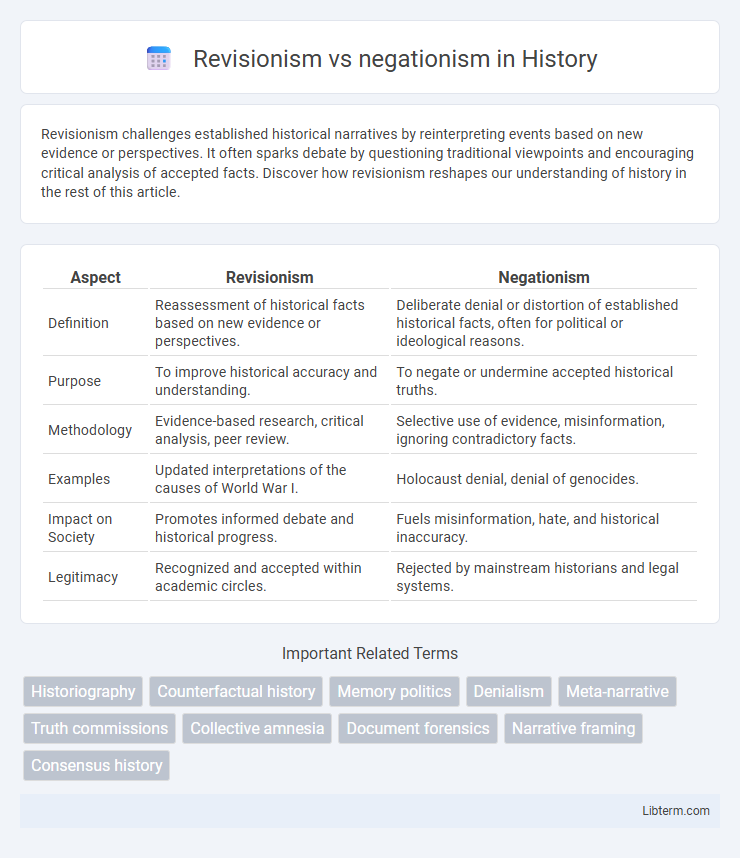Revisionism challenges established historical narratives by reinterpreting events based on new evidence or perspectives. It often sparks debate by questioning traditional viewpoints and encouraging critical analysis of accepted facts. Discover how revisionism reshapes our understanding of history in the rest of this article.
Table of Comparison
| Aspect | Revisionism | Negationism |
|---|---|---|
| Definition | Reassessment of historical facts based on new evidence or perspectives. | Deliberate denial or distortion of established historical facts, often for political or ideological reasons. |
| Purpose | To improve historical accuracy and understanding. | To negate or undermine accepted historical truths. |
| Methodology | Evidence-based research, critical analysis, peer review. | Selective use of evidence, misinformation, ignoring contradictory facts. |
| Examples | Updated interpretations of the causes of World War I. | Holocaust denial, denial of genocides. |
| Impact on Society | Promotes informed debate and historical progress. | Fuels misinformation, hate, and historical inaccuracy. |
| Legitimacy | Recognized and accepted within academic circles. | Rejected by mainstream historians and legal systems. |
Understanding Revisionism: Definition and Purpose
Revisionism involves reinterpreting historical events based on new evidence or perspectives to provide a more accurate or nuanced understanding. It aims to refine or update established historical narratives without denying the occurrence of facts. This approach contrasts with negationism, which deliberately distorts or denies historical facts, often for ideological reasons.
The Essence of Negationism: Denial and Distortion
Negationism actively denies established historical facts, particularly regarding genocides and crimes against humanity, by distorting evidence and rewriting narratives to serve ideological agendas. Unlike revisionism, which involves critical re-examination of history based on new evidence, negationism intentionally manipulates or suppresses truths to negate responsibility or minimize atrocities. This denial undermines collective memory and impedes justice by fostering misinformation and historical amnesia.
Historical Contexts: Origins of Revisionism and Negationism
Revisionism emerged during the late 19th and early 20th centuries as historians sought to reinterpret established narratives based on new evidence and methodologies, aiming to provide a more nuanced understanding of historical events. Negationism, by contrast, originated primarily in the post-World War II era as a deliberate denial or distortion of historical facts, particularly concerning atrocities like the Holocaust, often to serve political or ideological agendas. While revisionism is an accepted scholarly practice in historiography, negationism is widely condemned for its unethical manipulation of history and its rejection of empirical evidence.
Key Differences Between Revisionism and Negationism
Revisionism involves reinterpreting historical facts based on new evidence or perspectives, often aiming to improve understanding or correct biases. Negationism deliberately denies or distorts established historical facts, typically to promote ideological agendas or erase uncomfortable truths. Key differences include revisionism's commitment to evidence-based analysis versus negationism's intentional refusal to acknowledge verified historical realities.
Motivations Behind Revisionist and Negationist Approaches
Revisionist approaches to history are motivated by a desire to re-examine and reinterpret established narratives using new evidence and perspectives, aiming to achieve a more accurate understanding of events. Negationist motivations often stem from ideological goals or political agendas seeking to deny or distort factual historical events, particularly in cases such as Holocaust denial. Both revisionism and negationism impact historical discourse but diverge fundamentally in intentions--critical re-evaluation versus deliberate denial.
Famous Cases: Revisionism and Negationism in History
Revisionism in history involves reinterpreting established narratives based on new evidence or perspectives, exemplified by the reassessment of the causes of the Cold War. Negationism, or historical denialism, rejects well-documented facts, such as Holocaust denial by groups distorting Nazi genocide records. Famous cases include the revisionist arguments about the dropping of atomic bombs during World War II and negationist efforts to downplay or deny genocides like the Armenian and Rwandan massacres.
Impact on Collective Memory and Society
Revisionism reinterprets historical facts to provide a more nuanced understanding, influencing collective memory by promoting critical engagement with the past. Negationism denies or distorts established historical events, often undermining societal trust and fueling misinformation, which can polarize communities and hinder reconciliation. The contrasting impacts shape national identities, public discourse, and educational frameworks, highlighting the importance of accurate historical representation in maintaining social cohesion.
Ethical Implications of Historical Interpretation
Revisionism challenges established historical narratives by incorporating new evidence and perspectives, fostering a more nuanced understanding of events. Negationism, by contrast, deliberately distorts or denies historical facts, often to serve political or ideological agendas, raising significant ethical concerns. The ethical implications of historical interpretation emphasize the responsibility of historians to maintain accuracy and resist manipulation that can perpetuate misinformation and undermine justice.
Combating Negationism: Strategies and Policies
Combating negationism requires comprehensive legal frameworks that criminalize Holocaust denial and other forms of historical negation. Educational policies emphasizing critical thinking and inclusive curricula help counteract misinformation by fostering awareness of verified historical facts. Collaboration between governments, academic institutions, and non-governmental organizations strengthens surveillance and intervention efforts against negationist propaganda.
The Role of Education in Addressing Contested Histories
Education plays a critical role in addressing contested histories by fostering critical thinking and promoting evidence-based understanding of revisionism and negationism. Incorporating diverse perspectives and rigorous analysis helps students discern between legitimate historical reinterpretation and the denial or distortion of facts, especially in sensitive contexts like the Holocaust or colonial histories. Curricula that emphasize primary sources, ethical reflection, and scholarly debate contribute to building informed citizens capable of resisting historical negationism.
Revisionism Infographic

 libterm.com
libterm.com